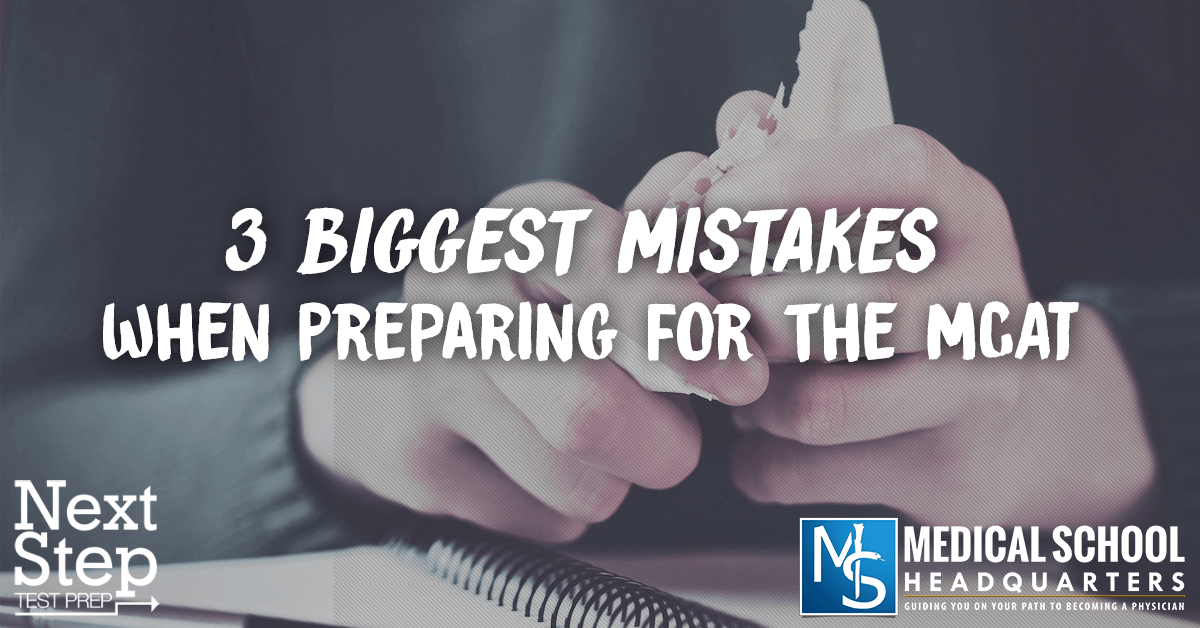
In today’s episode, we talk about the 3 biggest mistakes premed students make when preparing for the MCAT, along with how to avoid these mistakes.
Listen to this podcast episode with the player above, or keep reading for the highlights and takeaway points.
Buy-Another-Book-itis: It’s a disease that med students and premed students get where “everything will be great if they buy another book.” So they end up spending hundreds and hundreds of dollars buying resources that are not necessary.
Learn the MCAT books you already have. Any books from the major test prep companies are going to be good, and you only need one set. But you’ve got to really spend some quality time with them, as we’ll cover below.
Learn the MCAT books you already have. You don't need multiple sets of MCAT books.Click To TweetCommon scenario:
Students take a practice test. They get a score, and then take another test and get another score and take another test and get another score.
What you need to do:
Reviewing all the questions means reviewing all the questions, including those you got right. Why did you get them right? How will you do it again on your test day?
When reviewing your MCAT practice tests, look at the questions you got right, too. Why did you get them right? How will you do it again on your test day?Click To TweetCommon scenario:
Students get lazy and only take part of a practice test.
What you need to do:
Simulate your test day and treat it like your real exam. Wake up early. Take the same length of breaks as you get in the real MCAT. Try to practice like the real thing.
[Related episode: How Many MCAT Practice Tests Should I Take?]
Common scenario:
There is so much material covered on the MCAT that you feel like you have to move on to the next chapter, even if you haven’t mastered the one you’re working on.
What you need to do:
Warning: Falling into this MCAT mistake will entirely screw up your application timeline.
Common scenario:
Making this mistake doesn’t just lose a day or a week. You’re losing a month or more of time and potentially screwing up your entire application timeline. It’s important to apply early in the cycle. Don’t let your MCAT be the missing piece that delays your application.
What you need to do:
At the end of the day, your MCAT score, although not the only part, is a huge part of your application. So making sure you’re ready to take it is very crucial. How do you know when you’re ready to take the MCAT? It’s all about your practice test scores. We explore that question in more detail in episode 37.
Don't rush the MCAT. Only take it when you're ready.Click To Tweet
Lorem ipsum dolor sit amet, consectetur adipiscing elit
I just received my admission to XXXXX! This is unreal and almost feels like I am dreaming. I want to thank you for all of your help with my application. I cannot overstate how influential your guidance and insight have been with this result and I am eternally grateful for your support!
IM SO HAPPY!!!! THANK YOU SO MUCH FOR ALL YOUR HELP, IM INDEBTED TO YOU! Truly, thank you so much for all your help. Thank you doesnt do enough.
I want to take a few moments and thank you for all of your very instructive, kind and consistent feedback and support through my applications and it is your wishes, feedback, and most importantly your blessings that have landed me the acceptance!
I got into XXXXX this morning!!!! It still has not hit me that I will be a doctor now!! Thank you for all your help, your words and motivation have brought me to this point.
I wanted to once again express my heartfelt gratitude for your help in providing feedback during my secondary applications. Your guidance has been instrumental in my journey.
Just wanted to share my wonderful news! I received my first medical school acceptance! Thank you for all that you do for us Application Academy!!!
I am excited to tell you that I just got my third interview invite from XXXXX today! I can’t believe it. I didn’t even know if I was good enough to get one, let alone three – by mid-September. Thank you so much for all of your help and support up to this point; I would not be in this position without it!!
I wanted to thank you for helping me prepare for my XXXXX interview. Even in a 30-minute advising session, I learned so much from you. Thank you for believing in me, and here’s to another potential success story from one of your advisees!
I just received an acceptance with XXXXX! This is so exciting and such a huge relief and so nice to have one of our top choice schools! I also received an interview with XXXXX which brings the total up to 20 interviews! Thank so much, none of this would have been possible without you!

Join our newsletter to stay up to date
* By subscribing you agree to with our Privacy Policy and provide consent to receive updates from our company.
Resources
Advising Services
Podcasts & Youtube
Books
About
"*" indicates required fields